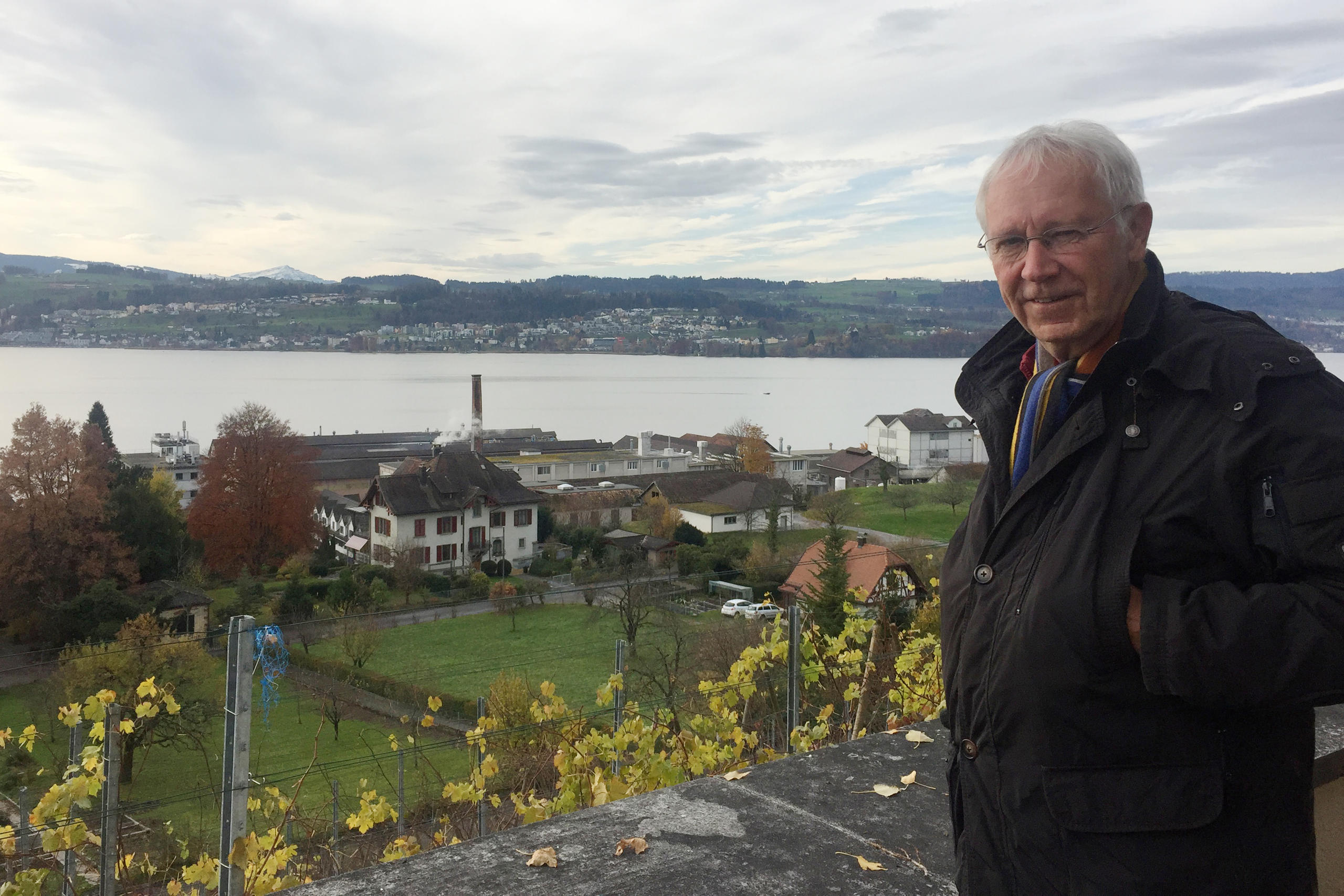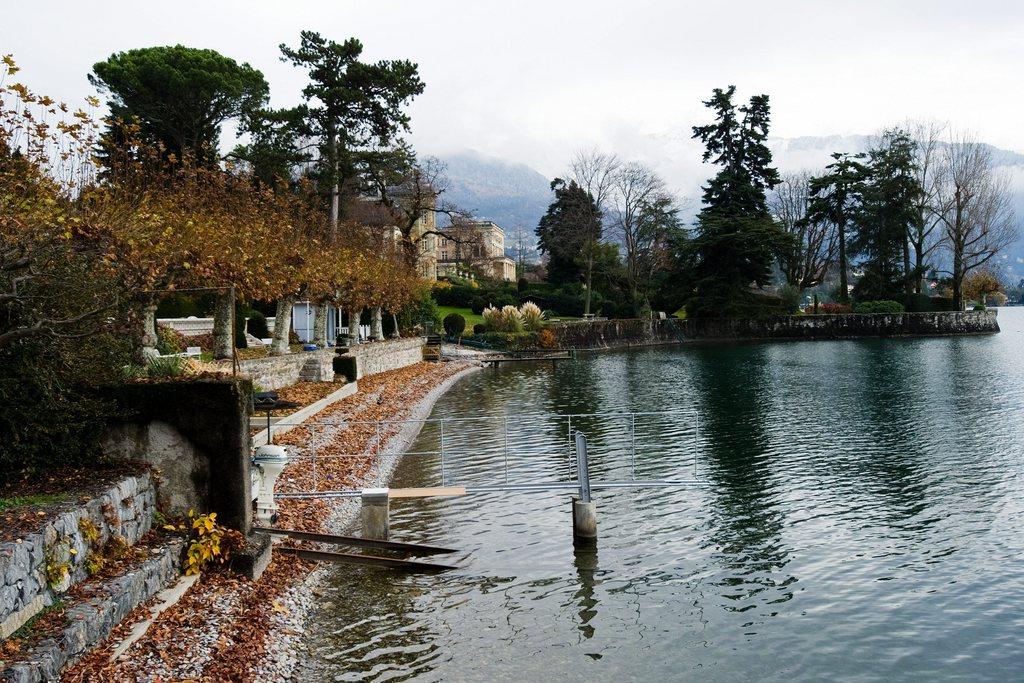
Swiss village showcases battle over lakefront access

Countless super-rich people have fulfilled their dream of a Swiss villa with private access to water. But legally, the public has access to all lakes and rivers. A waterside “class war” has therefore been waged all over the country for decades.
In Uetikon am See, a small municipality on the shores of Lake Zurich, an old chemical factory owned by industrial group CPHExternal link blocks access to the water. For 20 years, Rolf Käppeli successfully fought to ensure that the plot of land belongs to the public.
Käppeli says the factory is on built-up land – land that the lake would otherwise cover and as a result is public property. The former teacher argues that this should also count in the case of the factory’s grounds.
The local council sees things differently. The Zurich cantonal government previously decreed that built-up land could be entered in the land registry – and users could therefore become owners.
For Urs Mettler, the current mayor of Uetikon, the issue is clear: “This land belongs to the factory.”
Residential construction
Käppeli says he published four articles in the local newspaper “and the village started to vibrate”.
To mark the conclusion of the series, he organised a podium discussion with representatives from the municipality, the factory and of course residents. “A conclusion of reconciliation,” he says.
But it was also an event at which the heads of CPH signalled unambiguously that they wanted to hang on to their location in Uetikon – despite the future looking uncertain for Switzerland remaining a production location for the company.
Six years later, CPH has moved part of production abroad, freeing up space in Uetikon. The factory owners are planning a residential construction project: 200 flats with a lake view, which on this side of the lake can be sold for millions or rented for thousands a month. Welcome to Zurich’s Gold Coast!
“That hurt!” Käppeli says. “You can’t make a profit off land for which you never paid.”
Yet the Uetikon council remains firmly behind the project. “At the time it was the only possibility of getting at least partial access to the lake,” Mettler says.
Too critical
So Käppeli started researching again. After a couple of articles, however, the village newspaper fired him for being too critical towards the luxury housing project.
Ironically, that enabled him to reach an even wider audience, when he joined the Tages-Anzeiger, Zurich’s largest newspaper. He now reports to a national readership about the events going on in his village – “without taking sides,” he declares.
One hurdle for the factory owners was that for their project they needed the blessing of the municipal assembly, i.e. the residents. This is the cornerstone of local direct democracy in Switzerland. The assembly, which met in March 2017, attracted 805 people – five times more than usual.
Following the rejection of the building plans by 56% of voters, the factory owners announced they would continue to use the property for industrial purposes. This, however, has yet to happen.
#Dear Democracy
This text is part of #DearDemocracy, a platform on direct democracy issues, by swissinfo.ch. The views expressed in this article are solely those of the author, and do not necessarily reflect the views of swissinfo.ch.
Käppeli, who is no longer active as a journalist, co-founded the association “Uetikon on the lake”. They organised information evenings, collected signatures for petitions and handed in an initiative to the Uetikon authorities on how to design the shore.
“The municipality showed little interest in that,” he says. “They were still angry with us for blocking the residential construction project.” In their opinion, this would have attracted new – and rich – residents, who would have topped up the local coffers nicely.
According to mayor Urs Mettler, “Rolf Käppeli repeatedly asked the local council to come up with a plan for the land, but we always refused, because, as mentioned, it’s private property. That would equate to dispossession.”
Turning point
The turning point came a year ago following an announcement by the canton that it was planning to build a new secondary school in the area. Mettler says he quickly sought a discussion with the factory owners.
These agreed to apply, with the municipality, to be the location for the new school. Negotiations with the canton followed, and a purchase price of CHF52 million ($53.4 million) was eventually agreed. The municipality thereby acquired half the land.
Rolf Käppeli reckons he and the association played a leading role in this development.
“We saw we had no chance against the municipality, so we introduced to the canton the idea of restructuring the shore via various new channels. We wanted to make the canton aware of the situation in Uetikon,” he says. “They were more open to what we had to say than the municipality.”
Mettler disagrees, saying Käppeli’s association had no part in the canton’s decision on the school location. “The most they did was disrupt the negotiations.”
The canton also denies the association’s influence. “The opponents had nothing to do with the school decision,” says Markus Pfanner from the department of communication for the Zurich construction authorities.
‘Chance Uetikon’
A park, a swimming pool, homes, a leafy garden restaurant – all that can now be built next to the school overlooking the lake. That, at least, is what the “Uetikon on the lake” association and many locals envisage.
In November 2017, the group presented its proposals at a participatory process – like all other interested parties. It was led by the canton and had the conciliatory name, “Chance Uetikon”. The result is that a lakeshore zone will be created.
But the effort and commitment have taken their toll on Käppeli. “Experiencing democracy up close can really wear you down,” he says. “Your path is strewn with many obstacles and you need a lot of patience, doggedness, energy and fight.”
According to the Swiss Civil Code, all lakes and rivers in Switzerland belong to the public. Consequently, all shores and banks must be publicly accessible.
In reality, however, this is not always the case, since rich people buy lakeside estates which are private property.
The largest organisation that works for more public accessibility to shores and banks is Rives Publiques in Geneva, which supports local groups across Switzerland. It also helped in Uetikon.

More
Footpath impasse is a ‘slap in the face’ for voters
Translated from German by Thomas Stephens

In compliance with the JTI standards
More: SWI swissinfo.ch certified by the Journalism Trust Initiative


























You can find an overview of ongoing debates with our journalists here . Please join us!
If you want to start a conversation about a topic raised in this article or want to report factual errors, email us at english@swissinfo.ch.